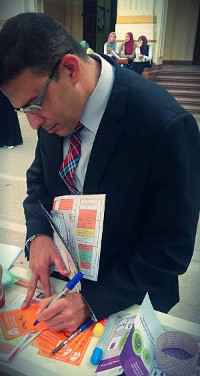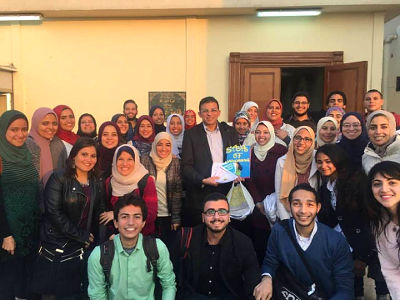Using AI to control energy for indoor agriculture
30 September 2024
Published online 13 December 2016
Ramy Karam Aziz is causing ripples in his circles through unorthodox mentorship methods. But is bucking the trend bearing fruit?

Aziz, whose interests are in microbial systems biology, genomics and metagenomics; microbiome and resistome analysis, and who studied bioinformatics and computational biology, had received his PhD from the University of Tennessee in the US.
Aziz returned to Cairo with a dream.
As one of the few scientists who specialized solely in bioinformatics and genomics in Egypt, he wanted to impart this fascination to students. “It's a long-term investment. My dream is to have a hub of bioinformatics in Egypt,” he says, referring to India as a possible model for Egypt to follow.
Aziz’s social media is already swarming with grateful students who swear by his teaching methods, and claim that his passion is contagious. Some are even saying he’s introducing a new “experience” of science to Cairo University.
But Aziz brushes the compliments off, acknowledging that he’s making an effort to better the learning the experience but he’s “not there yet”. He tells NME that he doesn’t like to sound disillusioned about the situation of science in Egypt. He says he’s not very optimistic, but insists that history is not linear and “perhaps something will happen and turn the situation around.”
But what does Aziz do that is so different from many of his peers to inspire his students? Nature Middle East spoke with the scientist about how he’s creating a “new system” of mentorship that he believes can help young researchers break ranks with the mainstream. He discussed whether or not his efforts can multiply or do much to stop “the brain drain” that plagues Egypt’s academic circles.
Q: Ramy, you’re trying to make an impact on your students by refreshing the teaching system at your faculty, introducing things like e-learning, common in the West but foreign to Egypt’s public universities, and applying unconventional teaching methods. How difficult has it been to depart from tradition?
RKA: I don't believe in top-down reform or sudden revolutions. I don't believe that big changes happen by toppling the system. So my focus is on humans. I tell myself if I just change the life of one student, that's enough for me. I want to help them grow in knowledge and become scientists. Of course, the students I teach might end up leaving Egypt, but I always hope they can come back and fix the system. I’m hoping for a domino effect to take place. It's not my business to wait for the fruit, I'm not banging my head against the wall.
I'm not exactly fixing the system here, but trying to slow the damage. One of things I work at embedding in my students is actually a fundamental part of the scientific method: doing science, then making results available. I want them to publish during their study years, which is very rare here.
Q: What are some of the challenges you face in this area?
RKA: Well, we’re outcompeted of course [because of the] lack of money and lack of material resources. In San Diego, I'd order a primer for DNA amplification before 6 pm and I’d get it before noon the next day. In Egypt, we get it 3-4 weeks later and these are basic reagents. What I do in three weeks there requires three times the time here, if not more. And that's not including other problems like the bureaucracy and the worsening economy.
Some people are trying to beat the competition. They're playing the same game – breathlessly trying to do exactly what the American scientist is doing but with some delay. In my opinion, the only way to beat the competition is to be two years ahead, do something extremely innovative.
So what I’m doing with my students here is "symbolic". It’s aimed at teaching them how to do science, how to produce knowledge. But we’re not on equal footing, especially in that brand of experimental biology.

RKA: I try to ignite the student’s curiosity by always giving them more. It’s not about grades, which is not the norm here, it's about nurturing passion. I even give "nerdy" bonus points questions to challenge the over-achievers. I target everyone but I also give part of my focus to the minority who're exceptional - the outliers. I try to make the excellent students more curious. But I also try to engage those who want to learn.
One of the things that I tell my students on the very first lecture [at the start of the academic year] is that we’re no longer in an age where the professor has all the knowledge. I tell them that teaching is collaborative; that their collective knowledge is higher than mine. Revolutionary educator Paulo Freire had once said that classical teaching, which is the norm in Egypt, is part of the culture of oppression and brainwashing. I agree with him. I tell my students: By the time I tell you this, it's old. By the time something makes it into a textbook, it's old. Our field is dynamic. I can only teach how to access knowledge.
So in a way, I'm a mediator, a bridge between science and students. It works and the students appreciate it. They get the core of what I try to do, which is I treat them as peers, I respect them. I love science or I try to make them love science. They never say I'm a brilliant orator, I'm not charismatic. But many professors belittle students and complain about their poor education, I don’t. It's paradoxical. You're like a doctor who tells the patient you're too sick so I can't treat you.
Q: Your teaching style is heavily focused on doing research, even if it’s on a small scale, it’s part of the culture you want to create, you say. You also encourage students to start their own science blogs and you follow up with them. Is that really new to an established university like Cairo University?
RKA: [In Egypt], we put much higher weight on taught courses than research…. I'm doing the opposite [at Cairo university]. We're a science research institute not a teaching institute. We're a place for science not education. If you only teach second-hand science, then you're not doing it right. Most of the professors, once they get promoted, don't do research anymore. Access to primary research is low.
If we can't produce state-of-the-art science, then the least we can do is focus on some areas of research in order to be able to teach. If you’re not willing to produce knowledge even on a small scale then you're not fit for teaching at a university scale. It's very different teaching something that you've researched than something you're remotely associated with or only read about it.
I'm trying to put science back where it belongs — at the centre of academia.
Q: I imagine it’s not easy.
RKA: It's a fragile ecosystem until a critical mass adopts it. You have to depart from the system in order to be able to fix it, and that’s why you start by going abroad, then you come back to transfer the knowledge. It has to be a grassroots effort. Because by the time many professors become in a senior position or a position of power than makes them able to change something, they’re already compromised; already part of the system; they’re too old to change anything. Change cannot be born from the system that created the problem.
Q: What science values are you trying to instill?
RKA: There are certain values that are beyond culture, like the scientific method and the scientific environment, but everything else is negotiable. But for instance, we should nurture teamwork, and make research department-centered, and not investigator-centered. There are instances of course where you'll have to change the culture not the system. I'm coming up with a hybrid system. I'm not copying the West or the US system, because it won't work in Egypt. The Asian experience is very rich when it comes to lab teamwork for instance. We can borrow from their work ethics.
Q: What are some of the promising fields of science here that you believe students can focus on, if they can’t leave and pursue research elsewhere?
RKA: I’m biased but one of the ways to break free from the system is learning bioinformatics. I specialized in it in the US, specifically, computational biology, which is trying to understand the molecules using computers. We're not that outcompeted in this field since it's mostly brain games. We have the human power, the students are smart and motivated. We're sometimes limited by internet bandwidth and the lack of powerful computers. But these are not what's slightly holding us back. It's the ecosystem where students work, that's the main disadvantage. But that can be changed. It’s within our grasp. And that's by the way what Zewail City of Science and Technology was trying to change by creating a supportive environment for bright students. They held meaningful seminars with Nobel laureates, collaborations with 15 other labs. As a grad student there, you become part of a very efficient system. At Cairo University we have to create our own system. And we’ll have to force others to follow our lead.
doi:10.1038/nmiddleeast.2016.219
Stay connected: